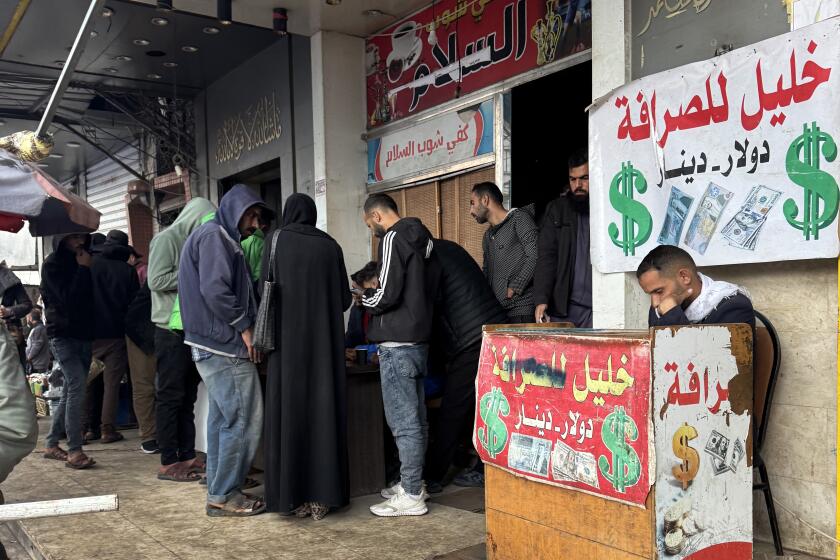Farmers and the Poor Fodder for Viet Progress
- Share via
HANOI — The government decided Ngoc Khanh Road had to be extended on the western fringe of this fast-growing capital, and the nearby residents weren’t at all happy about losing their homes and shops.
So unhappy, they boldly challenged the decision.
They haggled for months over compensation. Then, when the bulldozers were poised for action, a dozen tradespeople gathered outside Communist Party headquarters, holding paper signs pleading: “Ngoc Khanh Calls for Help.”
It was a radical action in Communist Vietnam, where any sort of dissent from government policy is routinely suppressed.
And, indeed, police hustled them onto a truck and back home. The road work went ahead.
But the brief demonstration was a manifestation of a spreading problem. As Vietnam fires up its economy for rapid development, urban poor and farmers are increasingly being forced to make way for highways, factories, airports and tourist hotels. They aren’t moving quietly.
Pleading ancestral roots and, in the case of farmers, lost livelihoods, the dispossessed are signing petitions, tramping from one government office to another and staging protests.
In May, farmers in Kim No Village on Hanoi’s outskirts tried to stop an army work crew from plowing up their rice fields for a golf course financed by the South Korean conglomerate Daewoo. The villagers fought with stones and hoes; police drove them back with tear gas and electric batons. One woman died in the melee and four villagers were arrested.
Hanoi city officials said the Kim No farmers were offered new fields and financial compensation but demanded more.
“If this was their land, and we took it away, they would be right. But this is owned by the government,” said Khue, an official at the city Investment Department who refused to give his full name.
“The government gave them the land, and now takes it away. The government has taken care of them properly, but their belly is bottomless.”
There lies the heart of the problem: Under Vietnam’s communist system, the state owns all the land. The rights of the users are murky--something potentially troubling not only to farmers but foreign investors paying millions of dollars for 30- or 50-year “land-use certificates” so they can build factories and office buildings.
Residents rarely learn about projects that will displace them until the government announces approval. There is no public debate over the new land use or the amount of compensation, and no formal channel exists for appeals.
“Local officials have never talked in detail to us about compensation or when work would start,” said one Kim No farmer, who didn’t want his name used for fear of retribution. “We don’t trust them anymore.”
Phung Van Nghe, an official in the General Department of Land Administration, said people ordered to move can appeal to his office. But he also said that in his experience, such appeals have never succeeded.
Foot-dragging has delayed construction projects, however. The World Bank-financed widening of Vietnam’s main highway, Highway 1, was held up for months last year by residents’ demands for more money.
“The problem is, usually farmers don’t understand the long-term goal of the project,” Nghe said. “They don’t see the relationship between the government’s interests and their own interests.”
The interests on all sides seem to be in profit. The government usually moves the old residents to new plots of land and pays cash compensation worth several years’ income from their lost shop or rice field. But the new location is often less desirable, and the cash settlement falls far short of the price the government charges the new user.
It has been eight years since the government split up village cooperatives and restored family farming, and farmers now think of the land as theirs. They want to reap the windfall.
An unusually critical article in the Saigon Times, a weekly magazine, suggested the government should have the right to force relocation only for community services or national defense, not for commercial development.
“There are a lot of cases in which people think the authorities are making self-serving compulsory purchases,” the magazine said. “Land is purchased dirt-cheap and sold at high prices. It is not surprising at all that some people are becoming superbillionaires.”
Savvy residents in areas targeted for development have begun illegally cutting their own deals with land speculators. Others, seeing foreign businessmen look over a piece of property, move in as squatters, hoping for an undeserved share in the compensation package.
Officials abuse the system too. Prices for land use are negotiated case-by-case and in private, resulting in kickbacks and unauthorized sales. The Hanoi city government recently implicated nearly 200 officials in illegal land deals, mostly with rich and powerful Vietnamese who wanted to build private houses.
One solution would be to privatize land and let the market sort out all the problems. But after a recent Communist Party congress urged moves to strengthen, not reduce, the state sector, it’s a solution no one has dared propose--except the dispossessed.
“Our land is not nationalized,” several hundred farmers from villages around Ho Chi Minh City wrote in a petition last year as authorities made plans for an investment zone. “Our ancestors spent a lot of effort, sweat and tears to work the land.”
If it is taken, they wrote, “there will be no social equality.”
More to Read
Sign up for Essential California
The most important California stories and recommendations in your inbox every morning.
You may occasionally receive promotional content from the Los Angeles Times.










